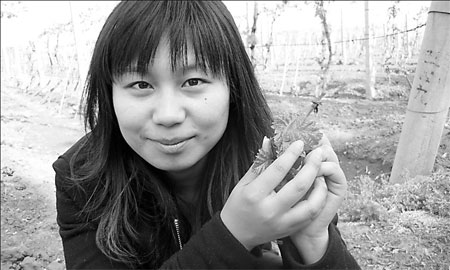Strawberry fields
|
Ma Bingchao has developed a plan to help boost farmers' income with strawberries and other crops. Courtesy of Ma Bingchao |
Ma Bingchao, 25, had never before been the target of ire as she was now, when villagers gathered closely about her, asking pointed questions about government grain subsidies. The new college graduate, working as a village official in Xiangying village in the Yanqing district of Beijing, forced herself not to feel intimidated, and hear out the aggrieved locals.
Villagers complained about low grain subsidies as compared with those of previous years, some of them making thinly veiled insinuations as to where funds might have been re-allocated.
Ma explained to them that the government had decided to decrease the subsidy on one crop in order to encourage villagers to diversify their crop cultivation, as planting a single crop inhibited possible increases in farmers' income. Her calmness and patience finally appeased the irate crowd of villagers in her office.
"I had no experience of such a situation," recalls Ma, recently elected deputy secretary of the village. She is the first college graduate to have been promoted to the rank of cadre since 2006, when 2,000 Beijing-based graduates joined local rural administration.
"Ma is the village's most reliable source of ideas. We are very happy to have a young person with professional skills contributing to the development of the village," says Guo Jianli, village head. "I have been looking for a capable person like her for a long time, and know that she will be a good secretary."
Ma was recently awarded 2,000 yuan ($294) by her alma mater, Beijing University of Agriculture (BUA) in recognition of her great efforts towards building "new socialist countryside" and achieving the development goal raised by the central government.
But Ma modestly acknowledges that her achievements are based on practical considerations.
Months before Ma graduated, a senior schoolmate fresh from his internship in Pinggu district told her that it would be possible to make optimum use of agricultural qualifications in rural areas, where agriculture professionals are badly needed. Working in the countryside was also a way of avoiding the fierce competition new graduates face within the job market.
Impressed by his observations, Ma decided to give rural work a try. Born and raised in Pinggu district, Ma is familiar with the rural environment, and her parents supported her decision.
The first test of her plant conservation expertise arose in the form of ailing willows in a neighboring village park.
As their leaves bore scabs Ma assumed the trees were suffering from a fungal infection, but the treatment she tried didn't work. It was only after consulting her former teachers and doing research that Ma pinpointed problem and successfully treated the willows.
"It gave me food for thought. I learned that locals had been using one kind of insecticide for years, and relied on experience that might do trees and crops more harm than good."
Ma took the bull by the horns. She logged each villager's mobile phone number and sent them information on the latest agricultural techniques.
"Cadres win villagers' trust only by putting themselves in their shoes", is Ma's explanation for her victorious election. "I will give the job everything I have and take new measures to develop our village."
Ma has announced a village 3-to-5-year development program. High on the itinerary is experimental strawberry planting as a means to higher profits.
Ma's motivation in this direction is the tradition among local farmers of planting rows of grape vines 5 m apart, which seems to her "a waste of space". Convinced that planting strawberries will bring greater, faster returns, she has returned to her university on several occasions to discuss the project with her teachers and other experts.
Ma reckons she is luckier than many graduates who work at the grassroots. Xiangying village's 1,100 population earns an annual average 7,640 yuan ($1,100), making it a relatively well-off village.

Her appointment is generally acknowledged as having added vitality to village life. Last month she invited a performance troupe from Hebei province to entertain elders with folk operas during the day, and younger villagers with dances in the evening.
The villagers were so appreciative that they built a brick house for the troupe to live in during their two-week stay.
"I really wanted to give them a hand but soon realized I was more of a hindrance than a help when it came to laying bricks," Ma admits. "All I could do was climb up and down ladders keeping laborers supplied with water."
College graduates should not consider themselves "elite professionals", Ma says. "We should live among common workers and work in the places where we are most needed."
The locals are unequivocally impressed with Ma. "She has won everyone's heart because she is capable and persistent," says farmer Zhao Donglian. "We badly need knowledgeable university graduates with new ideas."
Happily for Ma, she is not alone. She gets together every weekend with other young officials from neighboring villages to exchange views and share experiences.
About 150,000 college graduates worked in grassroots units in 2006, according to the Ministry of Education. And 3,000 Beijing-based college graduates now work as assistants to village heads.
Sun Zhenyu, deputy director of Beijing Personnel Bureau, says the municipal government guarantees successful candidates a monthly salary of 2,000 yuan ($250) the first year, 2,500 yuan the second year and 3,000 yuan the third year, provided their performance meets the required standards.
Measures to encourage college students to work in rural areas include awarding them 10 extra points at the postgraduate entrance examination, or to dispense with the postgraduate exam altogether if they have worked at grassroots level for two years.
"I think I can bring great changes to the village during my two-year term," Ma says confidently. "If they still need me, I will be glad to stay."
(China Daily 06/30/2008 page8)















